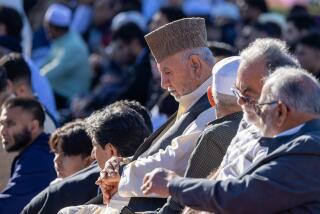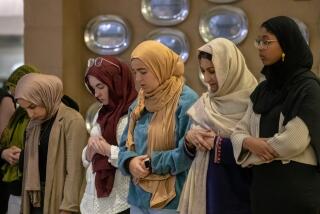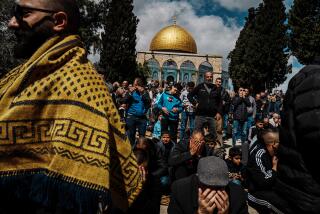New Muslim Panel Decrees a Date for Start of Ramadan
- Share via
Apparently resolving a debate that pitted eyeballs and ancient tradition against astronomers’ cold math, nearly all Southern California Muslims will begin observing the holy month of Ramadan on Monday.
The date was announced this week by a new Muslim council, which represents more than 75 mosques and Islamic groups from Santa Barbara to San Diego.
The Islamic Shura Council of Southern California was formed nine months ago to “oversee, if not direct, the issues of common interest and concern” to an estimated 500,000 Muslims in the region, said the council’s facilitator, Shakeel Syed of Corona.
Although supporters look to its potential influence on social, political and economic affairs, the council’s biggest coordinated effort so far has been to try to settle a sensitive religious question--when does Ramadan begin and end?
Many Muslims prefer to follow tradition by peering into the night sky, beginning Ramadan after the first crescent sliver of the new moon becomes visible, or by relying on reports of sightings from overseas.
The problem, Islamic leaders say, is that reported sightings from Saudi Arabia have often come a day or two before it was scientifically possible to see the new moon--resulting in different starting and ending points for observing the month of daytime fasting.
Last year, at least four Islamic prayer centers in Southern California observed earlier dates than the majority.
But representatives from 26 Islamic centers in Southern California unanimously agreed in mid-December that Ramadan this year cannot begin before Monday, based on astronomers’ calculations that it would be impossible to see the new moon before then.
Syed said this week that he knew of no mosque, or masjid, the Muslim term for prayer halls, that was not in agreement.
“In due course, we hope and pray that the Muslim communities who rely strictly on moon sightings from other countries would consider using methods to sight the moon locally and use the astronomical data available,” Syed said.
“This is only happening in the United States where we have Muslims from all parts of the world,” said Shabbir Mansuri of Fountain Valley, director of the Council on Islamic Education. “This [agreement on Ramadan dates] is part of what I call the United States’ gift to the rest of Islam.”
Ibraham Hooper, a spokesman for the Council on American-Islamic Relations in Washington, said that Mansuri may be overstating the significance that international Islam will place on the developments in North America.
*
Nevertheless, Hooper said he changed his initial news releases, which said that Ramadan will start on Sunday, to Monday after learning of the Southern California council’s decision based on consultations with astronomers.
Hooper, as well as Southern California Muslim leaders, emphasized in interviews that the practice of looking for the slender crescent of the new moon was not being discouraged--only that Muslims are encouraged to do it on a night when it can be corroborated by science.
The moon sightings are “part of the enjoyment of Ramadan,” Hooper said. “For most people, it is a unifying experience.”
Masood Rana, president of the Islamic Center of Northridge, said he prefers to look for the moon, but acknowledged that overcast skies often make that difficult.
“I don’t see anything wrong with the scientific method for calculation--we already use it for giving our prayer times,” said Rana, referring to the Islamic requirement that followers pray five times each day.
The advance determination also allows Muslim communities to reserve facilities for thousands of believers to gather for mass prayers on Eid al-Fitr, the three-day feast that marks the end of fasting. That will begin on Feb. 20.
During Ramadan, able-bodied Muslims are expected to refrain from food, drink and other sensual pleasures from break of dawn to sunset. The sacrifice, intended to encourage self-discipline and religious reflection, is one of the five pillars of the Islamic faith. Exempted from the fasting are young children, the elderly, travelers, the sick and pregnant or nursing women.
Ramadan is also a period of nighttime socializing, additional prayers and charitable donations. Muslims are encouraged to read the entire Koran, the sacred scriptures that Islam says began to be revealed to the Prophet Mohammed in the 7th century during the month of Ramadan.
By organizing the Islamic Shura (Arabic for “mutual consultation”) Council of Southern California, regional Muslim activists are following a pattern started in other major U.S. cities. A nationwide shura was formed in 1993, with the presidency rotating annually between the heads of two large Islamic federations and two African American orthodox Muslim leaders, Imam W. Deen Mohammed of Chicago and Imam Jamil Al-Amin of Atlanta.
The Southern California shura is managed on a volunteer basis by Syed, who is the national marketing director for a company that sells educational materials for Islamic children. The shura’s nine administrators are advised by a general assembly, which will hold its regular quarterly meeting today at the Islamic Center of Northridge.
Syed said that the shura council’s statements are not binding on its 56 member mosques and other affiliated groups.
But the weight of Koranic advice is for Muslims to speak with a unified voice, he said, quoting Chapter 3, Verse 103: “Hold fast to the rope of Allah all together and be not divided among yourselves.”
More to Read
Sign up for Essential California
The most important California stories and recommendations in your inbox every morning.
You may occasionally receive promotional content from the Los Angeles Times.













